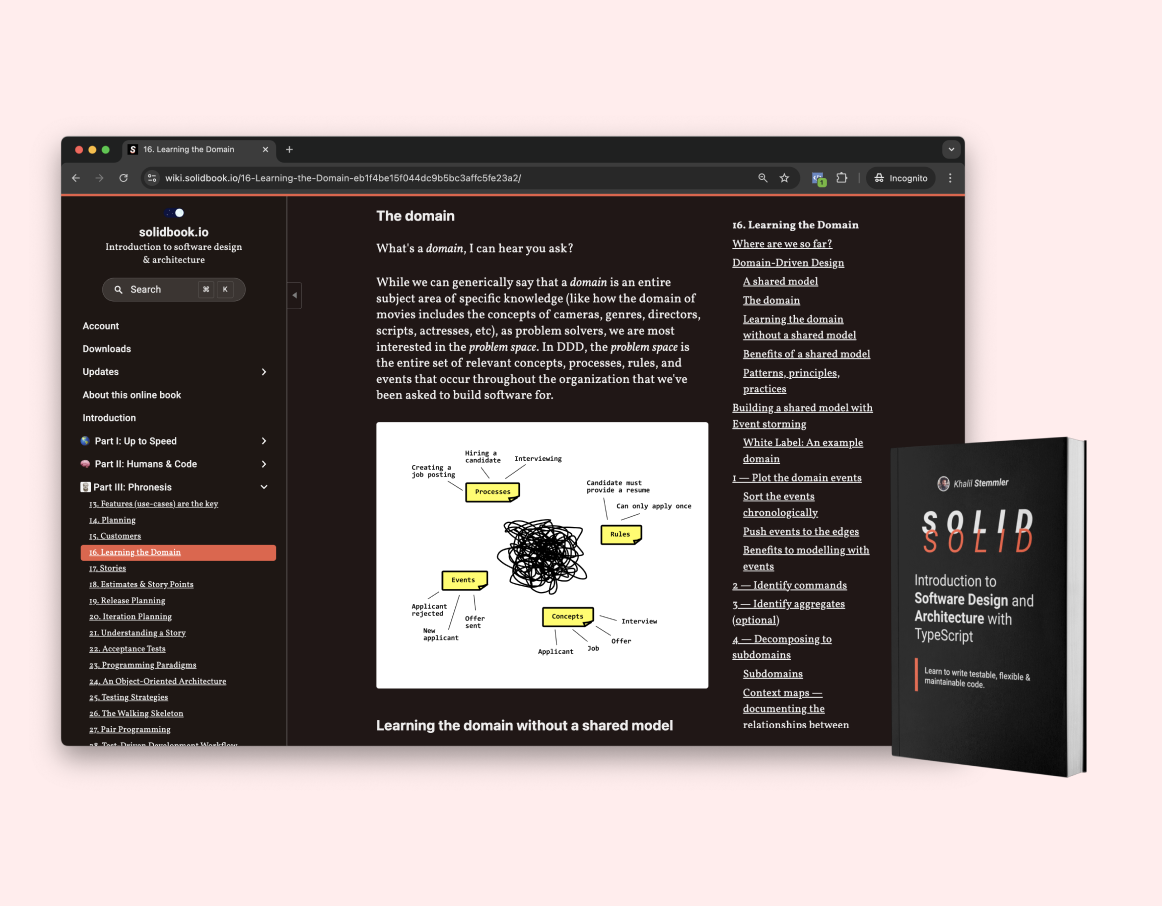Learn to write testable, flexible & maintainable code
- 🔥 Write testable, flexible, maintainable TypeScript w/ Node.js
- 🔥 Prevent unmaintainable code. Identify bad design and refactor towards a good one
- 🔥 Use OOP + Domain modeling to tackle apps of any complexity
- 🔥 Structure business logic away from dependencies, frameworks, tools
- 🔥 Integrate Domain models into the heart of your application
- 🔥 Use the SOLID principles to prevent tightly coupled and untestable code
- 🔥 Separate the concerns of your application into domain, application and infrastructure layers
Get lifetime access to the wiki/book
Over 600 pages. Seriously. You'll get instant access on 👩💻 Web + 📱 Mobile + 📝 PDF + 📖 EPUB
or
NOW AVAILABLE
Learn to write testable, flexible, maintainable code
Ever wonder why your code gets worse instead of better over time? This wiki shows professional software developers the essential software design, architecture, and testing best practices they didn’t teach you in school.

What will you learn?
Here's what's important
✨ Clean Code
Everyone raves about writing clean code, but learning how to write code humans love to work with isn't straightforward. In this chapter, you’ll learn how to write brain-friendly code using human-centered design principles. We also cover coding conventions professional developers use in their everyday work like writing useful comments, organizing & naming things, testing, refactoring, error handling, and so much more.
⚙️ Object-Oriented Programming & Domain Modeling
Ever wondered where to put your business logic? In this chapter, we learn how to use OOP properly to tackle apps of any complexity. We revisit and relearn object-oriented programming; this time, with the sole purpose of using it to create rich domain models that encode and encapsulate complex business rules by structuring it away from frameworks, dependencies, tools & ORMs like Express.js and Sequelize.
🖼️ Design Principles
Design principles are like guardrails for well-crafted code. They help you identify what makes code great, as well as what causes code to devolve into not-so-greatness... Prevent unmaintainable code by learning how to apply essential software design principles. You’ll be able to identify poor design and apply patterns to refactor towards a better one.
📦 Architectural Principles
Do you find yourself changing features in one part of your app only to break a feature in another?
To accomodate change, prevent expensive refactorings, and keep code modular, testable and flexible, we learn how to use Conway’s Law to identify boundaries, enforce em’, and package them as well-defined components.
💿 How to Build a Real-World App with Domain-Driven Design
Sometimes CRUD and Model-View-Controller just isn’t enough. Domain-Driven Design is an approach to software development that helps you translate complex problem domains into rich, expressive, and evolvable software.
You’ll learn the main ideas behind Domain-Driven Design, how companies scale codebases from monoliths to microservices, and how to design and develop a real-world Forum application using DDD.
And so much more 💫
We're learning all the essentials of software design, following the "🖼️ Software Design and Architecture Roadmap", from Clean Code to Domain-Driven Design.
Reader reviews
“While I have you on here, I just have to thank you for the content you write. I never learned the programming principles and best practices that were so important for what I do every day, but after reading the book and articles my skill level jumped up considerably. My boss and team really noticed and I'm lined up for a promotion in the fall. It's all thanks to your help! Thanks Khalil!”

"I'm in the process of refactoring my backend, and your blog/solidbook has been a godsend. All the concepts are falling into place :)"
“I'm really excited about reading this book everyday. Between your book and it's links to the blog posts and @kentcdodds Testing with JavaScript, I feel like I finally have most of the instruction I need for becoming not only a better tester but SE as well. Thanks!"
“Spent most of my Sunday reading your articles and I found solutions to many, many issues that I've been stuck on for months! Thank you, just got your book :)
"Follow Khalil for great advice on software design and architecture. His roadmap has been so helpful in my growth as a SWE. Clean code, OOP, design patterns, DDD, all best practices that not a lot of tutorials cover. +1 for a fellow 🇨🇦!"
“Thanks for publishing this. Between the book and your blog, I've learned a lot.”
“Man I gotta say your book is a treasure."
“Khalil’s blog is so good and so is his book! Wealth of knowledge made easy to understand. The post on the Client Architecture was 🤯.
I already know I'm going to refer back to his content time and time again.”
Frequently asked questions
Why did you write this?
The truth is, not a lot has changed about the fundamentals of software design over the past 20 years, but there's a huge lack of training on it.
I tend to agree with Eric Elliot, who writes excellent content about software composition.
He says, "99% of working developers lack solid training in software design and architecture fundamentals. 3/4 of developers are self-trained, and 1/4 of devs are poorly trained by dysfunctional CS curriculum. And almost zero companies make up for those deficiencies with in-house training and mentorship. In other words, if you simply accept the status quo and refuse to offer training in-house, your team will be the blind leading the blind."
The fact that over $85 billion was spent fixing bad code in 2018, and that massively influential engineering companies like Uber are only now discovering Domain-Driven Design and other essential architectural patterns after 2200+ microservices, is a sign we could do better.
“Those who know not of history are also doomed to repeat their mistakes” (Santayana’s curse).
Software development is a relatively young trade compared to other trades out there. The way we perform our jobs isn't normalized the same way building a house or fixing a car is. Software developers with livelihoods and reputations can't afford to make big mistakes.
Who is this for?
Anyone paid to write software to provide value for a business, and to do it consistently.
Developers who want to learn how to design large-scale applications.
Developers frustrated with writing buggy code and breaking things all the time.
Developers who care about shipping quality code and want to learn how to write code that can actually be tested.
Developers who want to see their codebase actually improve as more code gets added to it, rather than degrade over time.
Junior full-stack developers who are comfortable with JavaScript & Node.js that want to learn how to write clean, flexible, testable, and maintainable software.
Bootcamp graduates who are curious to learn more about backend development.
Team leads, engineering managers, and CTOs who want a single resource to ramp their Junior developers up.
Blog readers interested in Domain-Driven Design.
How can I get future updates?
The wiki is done! But if there are any updates, you'll get an email and can check out the Updates tab in the wiki.
Tell me about the wiki
Books aren’t great mediums. They go out of date and they’re hard to update.
I take all my notes and manage my knowledge in Notion. I wrote a program that takes my Notion and executes a script that converts it to both a book (PDF, EPUB) and the wiki!
Readers who have purchased the book have access to the wiki, which lets you bookmark pages, download new versions, and submit feedback.
Refund policy?
Sorry, we can't offer refunds on this one.
Do you offer Purchasing Power Parity or Student Discounts?
Get in contact with me and I’ll hook you up with a discount.
I already bought the book, how do I download new versions?
How do I access the wiki?
If you’ve bought the book, you can use your login link to read the wiki. If you’re not logged in, you can send yourself a login link by entering your email.
Your site’s not working!
The wiki won’t work properly if you have Third Party Cookies disabled. If you’re using Chrome, you can fix this in chrome://settings/cookies. If you’re experiencing any other issue, let me knowand I’ll fix it.
I have another question!
Hit me up. I’m happy to hear from you.







